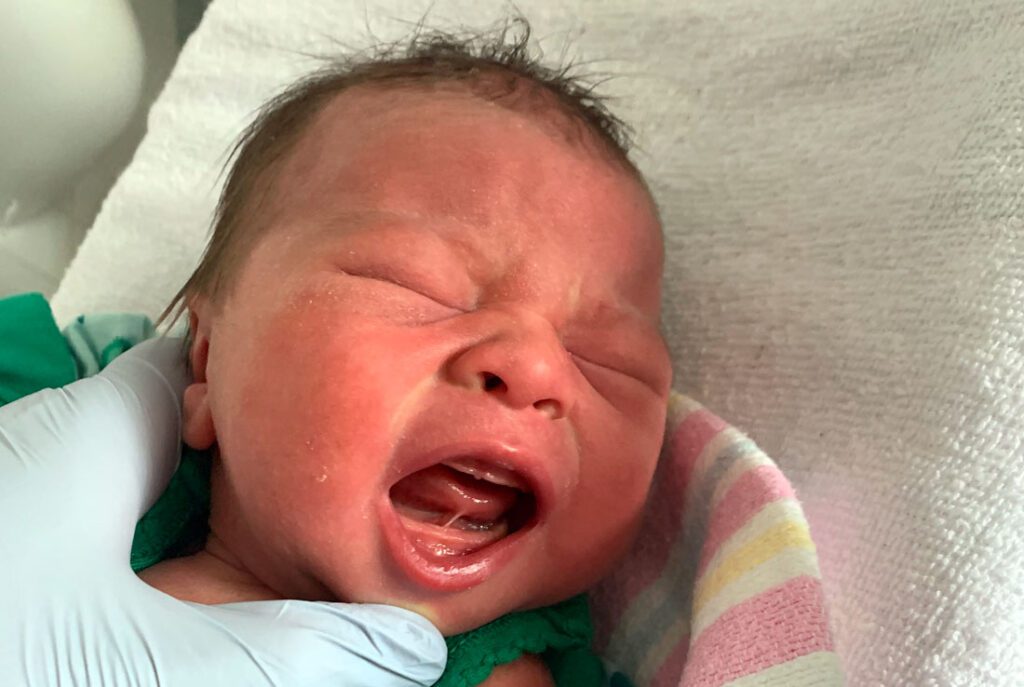Just A Trend?
There seems to be a lot of talk about tongue ties on social media. Talk to ten mothers of new babies, and chances are you will find at least one that has sought guidance about ankyloglossia (AG) or what is commonly called tongue tie.
But is this just a new trend or cause for concern?
What are Tongue and Lip Ties?
Ankyloglossia, tongue tie, is a congenital condition where a short frenulum restricts the movement of the tongue. The frenulum is the band of tissue that extends from under the tongue to the floor of the mouth. The lip frenulum or maxillary labial frenulum is the tissue from your upper lip to your gums. When this band of tissue is short or tight, it is a lip tie. Tongue and lip ties often present in tandem and occur more frequently in boys.
Not Just Something New

Ann Messner, MD, is a professor at Baylor College of Medicine and division chief of otolaryngology at Texas Children’s Hospital. She says, “There are woodcuts showing a physician cutting a newborn’s frenulum dating back to 1679.” However, with the advent of infant formulas around the middle of the 20th century, fewer people breastfed, and tongue ties seemed to fade away. When breastfeeding/chestfeeding became popular in the 1990s, tongue ties were once again on the rise.
What Are the Problems Associated with Tongue Ties?
Tongue and lip ties are more problematic when breastfeeding/chestfeeding than bottle feeding. The inability of the tongue to move freely can cause problems with the baby latching on the breast, contributing to painful breastfeeding, low milk supply, insufficient weight gain, and even failure to thrive.
However, due to sucking air while feeding, tongue and lip ties can cause problems with colic, excessive gas, reflux, and slow feeding with possible weight gain issues for bottle-fed babies.
Undetected and untreated tongue ties may even cause problems for toddlers and adults. The tongue is a powerful muscle necessary to transfer solid food from the front to the back of the mouth. Restriction of movement from a tie can make this difficult or even impossible. There is also some discussion about tongue and lip ties contributing to speech irregularities.
For a checklist to help determine if your baby may have a tongue or lip tie, visit this link.
https://tonguetieal.com/what-symptoms-does-a-tongue-tie-cause/
Treating Tongue Ties
Because many issues can contribute to feeding problems in an infant, finding a professional trained to detect tongue and lip ties is essential. Not all pediatricians know how to look for this condition. An IBCLC (international board certified lactation consultant), ENT, or other qualified professional can make an accurate diagnosis.

To treat tongue and lip ties requires a surgical procedure known as a frenectomy or frenotomy. This treatment is often done under local anesthesia in the doctor’s office. Although choosing this treatment usually depends on the severity of the tie, many practitioners opt to wait to see if the problem warrants treatment. Some oral motor therapists may suggest exercises and cranial sacral therapy to help. Following a frenotomy/frenectomy, parents will need to do exercises for three to four weeks to keep the tissue stretching.
Because there is a lack of research, there is often controversy surrounding diagnosing and treating lip and tongue ties. However, a recent RCT study by Dr. Bobby Ghaheri showed that babies feed more efficiently, are better able to adapt to changes in feeding, and had more rhythmic and coordinated sucking following a posterior tongue tie release. In addition, breastfeeding/chestfeeding had less painful nipples and greater confidence in feeding their babies. They noted that their babies had less spit-up, fewer hiccups, and were less fussy after this revision.
Conclusion
With far too little research about this congenital condition, knowing what to do can be confusing. Pediatricians don’t always know how to look for a tongue or lip tie. And even if they do, they often don’t consider it to be problematic.
But it definitely is a problem for the parent desperately trying to breastfeed/chest feed with sore, cracked nipples and low milk supply. It is a problem for the parent who watches their baby struggle with excess gas and painful bowel movements after every bottle.

In my practice as an Infant feeding Specialist and Postpartum and Infant Care doula, I see firsthand the struggle with lip and tongue ties. Both breastfeeding/chestfeeding and bottle-feeding new parents share their frustration as they discuss this with their pediatricians and are told everything is ok.
At Orlando Doulas LLC, we encourage you to trust your parental instincts.
If you think something is off with your baby and feeding… it probably is.
No one knows your baby better than you.
We can help you navigate feeding. A consultation with an Infant feeding Specialist might be all you need to get you and your baby on a comfortable path. If there is a suspected tongue or lip tie, we have referral resources for you to get the support you need to make the best choices for you and your baby.

References
- https://www.enttoday.org/article/explaining-the-dramatic-rise-in-tongue-tie-and-lip-tie-treatment/5/
- https://www.healthline.com/health/baby/tongue-tie
- https://tonguetieal.com/does-a-lip-tie-or-tongue-tie-affect-bottle-feeding/
- https://www.webmd.com/oral-health/what-is-lip-tie

